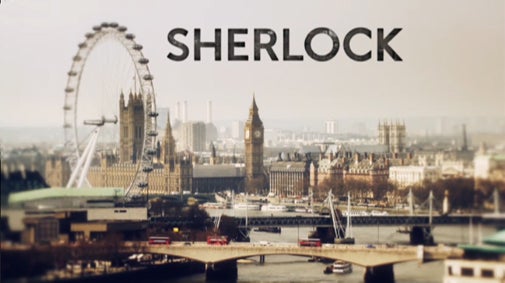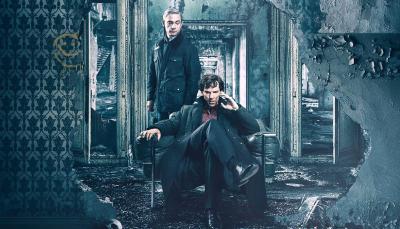Andrew Scott Weighs In on the Future of Sherlock’s Moriarty

In a recent interview with the Sun, Scott finally said straight out that “Moriarty is dead,” claiming “I don’t think there could have been any better exit for a character like that.” So, there you go, Moriarty’s really most sincerely dead. Personally, I’m still fairly certain that he’ll show up again – either in flashbacks or in some sort of figment-of-Sherlock’s-mind capacity – but I do think that Moriarty’s days of crime are over for real. Here’s the thing, though – Scott is a great actor and he certainly has wonderful chemistry with co-star Benedict Cumberbatch – but this news is more likely than not a good thing for the series.
Honestly, it’s easy to see why people would want to see Moriarty vs. Sherlock 2: Life After Death Boogaloo or whatever that would end up looking like. Cumberbatch and Scott do a wonderful job of portraying characters who are mortal enemies and inverse reflections of one another. Every scene between the two of them was fantastic and it’s hard to imagine a show voluntarily sacrificing that sort of onscreen rapport. Also, Lord knows that Steven Moffat is getting kind of famous for the fact that he likes to kill characters off and then through the magic of time travel, alternate universes, or elaborate staged stunts, bring them back to live again. (All the emotional angst; none of the long-term consequences!) What was the final count on number of times he killed Rory off on Doctor Who? Eight? Nine? In fact, it’s possible that Moriarty will be the only death he’s ever written/overseen that’s actually managed to stick
However, let’s keep in mind that the world of Sherlock is not the same as the world of Doctor Who. Moffat is able to use Rory as his own personal Kenny from South Park precisely because Who is in many ways a drama, but also exists in a genre that allows all those things as possibilites. No one is surprised when someone comes back from the dead on a science fiction show that’s built around the concept of time travel, the existence of aliens, and the possibility that there are multiple versions of our reality out there. Okay, sure, if you take all of that as necessary world-building truth, then what’s a little resurrection? It’s really not such a big deal – as frustrating as it can occasionally get. (It’s hard to emotionally invest in something you’re always nervous might be a take-back.) But Sherlock isn’t that kind of show, and as much as people might want to see Scott again, it shouldn’t become that show show. It’s a modern, mostly realistic crime drama that wants to exist in our real world. Sure, we just saw Sherlock fake his own death, but doubtless that’s going to be explained away as much the same style of illusion that used to let magicians saw women in half, rather than some sort of magical or deus ex machina intervention.
Moriarty’s death is a loss for fans, sure, but it’s a great move for the show. Sherlock is first and foremost a show about a truly epic friendship, but it’s also a show about logic, about the triumph of reason and deduction and science. Moriarty suddenly coming back from the dead would be, well, kind of ridiculous. Let’s not forget we actually saw him shoot himself in the head. (I’m sure someone somewhere has thought of some theory as to why or how this could have been faked, but let’s be real; it looked legit.) It was not only violent and gross – it actually said something really interesting about his character, about how dedicated he was to his obsession with Sherlock, how committed to the idea of ruining him that he’d kill himself to ensure that his nemesis had to die too. Scott’s right, this is an exceptionally fitting way for this character to go outk, and I’m also hard pressed to see how it could have been done any better or how any “second” exit would top it in terms of shock or intensity.
The real Moriarty only appeared in the canon a handful of times anyway and keeping the character around for too long does sort of lighten his impact. Sherlock should never become a series where every moment of shock, drama or emotional significance is subsequently tarnished by someone coming along a bit later to undo whatever it was you just watched. For example, it’s occasionally difficult to trust many aspects of the Doctor Who universe these days, precisely because Moffat has played so fast and loose with the series’ established rules and internal logic as regards time travel that literally anything is possible at this point – and not in a good way. There’s a point at which you have to say: okay, this happened, and move on from there. So, let Moriarty stay dead, and let’s see what other sorts of villains out there for Sherlock.
What say you, fellow fans? Glad to see that Moriarty is most likely no more? Upset? Convinced it’s all an elaborate fake-out and we’ll see him again?




